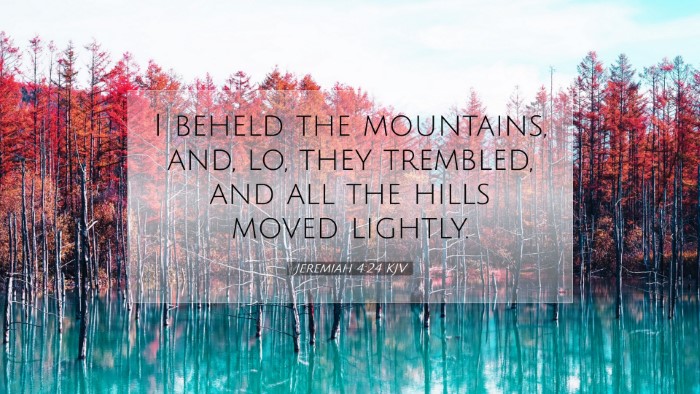Commentary on Jeremiah 4:24
Jeremiah 4:24 states, "I beheld the mountains, and, lo, they trembled, and all the hills moved lightly." This verse depicts a vision of divine judgment and the impact it has on creation itself. In understanding this passage, we glean insights from the writings of notable public domain commentators such as Matthew Henry, Albert Barnes, and Adam Clarke.
Contextual Overview
Jeremiah, often referred to as the weeping prophet, prophesied during a turbulent period in Israel's history. His message was one of warning, urging repentance before impending judgment due to the people's disobedience. Chapter 4 presents a crucial turning point, where the prophet vividly shares a vision meant to illustrate the gravity of his warnings.
Commentary Insights
Matthew Henry's Perspective
Henry emphasizes the geological upheaval as a metaphor for the imminent judgment of God. He interprets the trembling mountains and moving hills as indicative of the thorough shaking that God's judgments cause. Henry notes:
- The mountains symbolize the mighty and steadfast, yet they too quiver under the weight of sin's punishment.
- This trembling serves as a warning, illustrating that no power is exempt from God’s authority.
- Henry often reflects on the spiritual turmoil that reflects physical events, noting how divine displeasure can unsettle creation, reiterating that even nature reacts to the holiness of God.
Albert Barnes' Exegesis
Barnes approaches the text with a focus on the prophetic nature of Jeremiah’s vision. He observes:
- The trembling of mountains suggests a profound shift, symbolizing the panic and disarray that will affect not just the land but also the hearts of the people.
- Barnes points out that the swift motion of the hills presents a stark contrast to their usual stability, indicating that what once seemed secure is now threatened.
- He contextualizes this with the notion of natural events reflecting spiritual truths, thus asserting that God’s voice is powerful enough to cause natural phenomena.
Adam Clarke's Analysis
Clarke provides a comprehensive linguistic and cultural analysis of the verse. He articulates:
- The verb 'trembled' suggests a metaphorical shaking of the very foundations of society, signifying disaster and chaos.
- Clarke elaborates on the psychological state of the nation, reflecting that fear and apprehension permeate the understanding of God’s impending judgments.
- He also brings in the historical context, acknowledging how such dynamics were often seen as manifestations of God’s displeasure in ancient Near Eastern cultures.
Theological Implications
This verse serves to remind believers of the majesty and power of God over creation. Each commentator underscores a central theme: the sovereignty of God in both the natural and spiritual realms. These trembling landscapes echo God's judgments and serve as a poignant reminder of the seriousness of Israel’s sin and the urgency of repentance.
Application for Pastoral Ministry
For pastors and ministers, this passage can be a source of rich teaching. It encourages them to:
- Call congregations to recognize the weight of sin and the need for repentance.
- Illustrate the reality of God’s presence and His influence over the entirety of creation.
- Inspire a sense of urgency in communicating the gospel, as the tremors of judgment resonate with the realities of spiritual neglect.
Reflections for Theological Study
Theologically, this verse invites students and scholars to explore the following:
- The interconnectedness of the physical and spiritual realms in biblical thought.
- How prophetic literature employs metaphorical language to convey divine truths.
- The importance of understanding historical and cultural contexts in interpreting scripture.
Conclusion
Jeremiah 4:24 not only serves as a warning from the past but as a timeless reminder of God's sovereignty and righteousness. Through the insights of esteemed commentators, we can appreciate the rich tapestry of meaning woven into this verse, compelling modern readers—whether pastors, students, or theologians—to respond with reverence, urgency, and a desire for deeper insight into the character of God.


